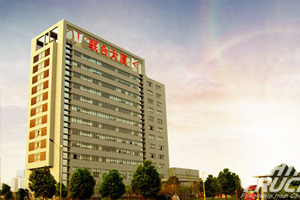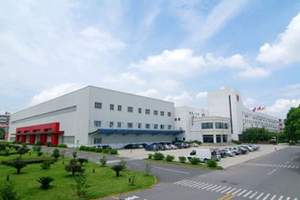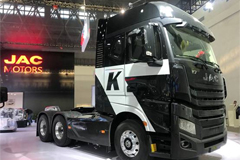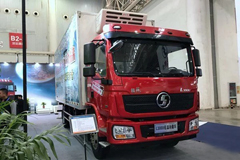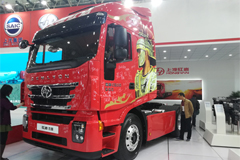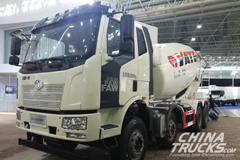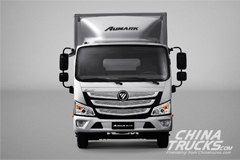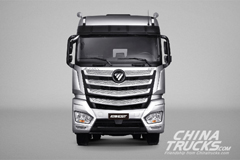Location:Chinatrucks >
news >
truck news > World’s First Fuel Cell Electric Delivery Truck Launched by UPS
World’s First Fuel Cell Electric Delivery Truck Launched by UPS
Date:2017-05-11 Source:trucks
www.chinatrucks.com: UPS, long a catalyst for the development of advanced-fuel commercial vehicles, took another step into the future Tuesday with the introduction of the world’s first hydrogen-electric Class 6 delivery truck.
The van, developed as part of a $10-million federal Department of Energy program, is the first of 17 hydrogen fuel cell vans the parcel delivery giant will be deploying in the U.S. by the end of 2018.
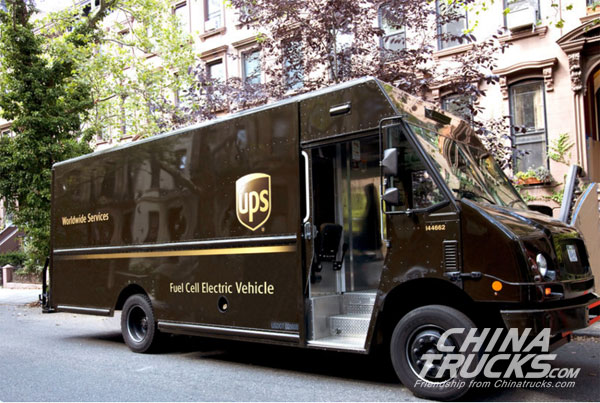
The initial van – unveiled at the 2017 Advanced Clean Transportation Expo in Long Beach, Calif., as a chassis and powertrain without the familiar brown UPS truck body covering it all up – will enter service later this year running parcels among state government offices in California’s capital city of Sacramento.
“We want to let [California legislators and regulators] know where the hard-earned dollars went,” UPS fuel cell systems chief engineer Michael Britt told Trucks.com.
He called the expected first use of the first fuel cell truck “the state-house route.”
California, which has the toughest air quality regulations in the nation, helped fund the van development program and is the country’s most aggressive promoter of hydrogen fuel cell technology, including development of a statewide hydrogen fueling infrastructure to service fuel cell vehicles.
UPS, which has a corporate policy of promoting alternative fuels and advanced powertrains to help reduce the environmental impact of its huge fleet, signed up for the hydrogen van program back in 2014 and has served as chief engineer on the project, Britt said.
The company also sees electrification of its vehicles as a way to reduce fuel and maintenance costs and is providing about $5 million in matching funds, mainly through development and engineering services. The Energy Department, the California Energy Commission and the South Coast Air Quality Management District, which oversees much of the Southern California area, will contribute the rest.
Hydrogen fuel cells are a no-combustion technology that require a constant source of fuel and oxygen to create electricity. They emit only water. Hydrogen tanks on a fuel cell electric car or truck can be refilled in about the same amount of time as liquid fuel tanks, eliminating the lengthy recharging times required by battery-dependent electric vehicles.
UPS’ fuel cell and electric powertrain system include the fuel cell itself, an off-the shelf, 31-kiloWatt model manufactured by Canadian fuel cell developer Hydrogenics; a pair of 5-kilogram, high-pressure hydrogen tanks; and a 45-kiloWatt-hour lithium-ion battery pack that will store and release the electricity produced in the fuel cell.
“Fuel cells make great sense as a way to extend the range of electric drive vehicles,” said Bill Van Amburg, senior vice president of Calstart, a Pasadena non-profit coalition that promotes clean transportation technologies.
Calstart recently completed a commercialization study that showed that there is a solid business case for fuel cell systems in transportation, as costs fall because of ongoing development and deployment programs.
Applying the technology to medium-duty trucks doesn’t captivate everyone, though.
Medium-duty vehicles are often used to haul loads in stop-and-go situations and they’re generally not used on regular routes so it could be difficult to manage hydrogen refueling for them, said Michael Held, a director of the automotive and transportation consulting practice at AlixPartners.
UPS will be using publicly available hydrogen stations in Sacramento and near its inland Southern California facility in Ontario, Britt said. If the trucks work well in the fleet, he said, “we would ultimately want to have our own” hydrogen stations at various UPS fleet depots.
Held also questioned the economics of fuel cells in medium duty and smaller commercial trucks, given the low price of diesel fuel today and the “still unknown but big cost of fuel cells for the foreseeable future.”
The first phase of the UPS program, development of the initial van, will cost $3.6 million, Britt said. Remaining funding will be used to build and deploy 16 more Class 6 fuel cell vans in the UPS fleet by the end of 2018.
“These are being hand-built,” Britt said, underscoring how new fuel cell technology still is in the trucking industry.
The demonstration fleet will be used to develop operating cost and reliability data and to assess just how well the fuel cell vans do in improving air quality in the neighborhoods they will be serving.
They will be watched by more than UPS executives and government agencies.
Because they have no tailpipe emissions and are quiet, hydrogen fuel cells powering electric drive trains would be desirable for the ubiquitous delivery trucks used by delivery services such as UPS and FedEx, said Charles Freese, executive director of global fuel cell activities for General Motors.
“No one wants to have the idling noise and diesel fumes in their neighborhood,” Freese told Trucks.com.
GM has partnered with Honda Motor Co. in an $85 million project to develop a hydrogen fuel cell manufacturing facility for future fuel cell vehicles from both companies.
Honda already markets a limited-production, California-only fuel cell car while GM and the U.S. Army are testing the ZH2, a fuel cell Chevrolet Colorado pickup-based military off-road vehicle.
GM also is a major light commercial van and truck maker.
“It would be great if the only sign that a delivery company was there would be the ring of your doorbell and the package left on your porch,” Freese said of the potential of quiet fuel-cell electric delivery vans.
The GM-Honda fuel cell partnership is designed to go beyond the present generation technology to develop hydrogen fuel cells that are smaller and cheaper but more reliable and more powerful.
UPS has invested heavily in exploring low-emission and alternative fuel vehicles through its Rolling Laboratory and now deploys more than 7,200 low-emission vehicles, including gas-electric hybrids, battery-electric vans and internal combustion vans using propane, liquefied natural gas and compressed natural gas instead of diesel.
The delivery company has signed an agreement to purchase 325 hybrid-electric delivery trucks from Workhorse Group Inc., a small manufacturer of delivery trucks and drones.
But UPS believes fuel cell electric trucks can serve as a longer-term “bridge” than battery-dependent electric systems to whatever alternative fuels and powertrains end up dominating the market in the future, Britt said.
Hydrogen fuel cell trucks certainly are gaining attention.
Last month Toyota Motor Corp., the world’s largest automaker, unveiled its Project Portal Class 8 fuel cell truck. It plans to launch testing of the vehicle at the ports of Long Beach and Los Angeles in June.
Toyota’s initial test truck is a Kenworth T660 chassis. The standard sleeper compartment has morphed into a custom aluminum shell housing a quartet of high-pressure hydrogen tanks and a pair of 6-kilowatt-hour lithium-ion batteries.
The fuel cell system also features a pair of fuel cell stacks from the Toyota Mirai passenger sedan with related cooling, power and control systems as well as two customized electric motors, all tweaked as necessary to handle the demands of a heavy-duty truck.
Toyota’s Class 8 fuel cell powers an electric motor that produces more than 670 horsepower and 1,327 pound feet of torque, roughly the same as the new Cummins X15 Efficiency Series diesel engine.
Nikola Motor Co., a Salt Lake City startup, also is developing a Class 8 fuel cell big rig.
Construction on a manufacturing and research and development center will take four to five years, according to Nikola. The first working prototype of a Nikola fuel cell big-rig won’t be ready until 2019. Nikola also plans to build a highway network of hydrogen filling stations to service the trucks.
Such zero-emission vehicles have an advantage in markets where clean-air goals are a major economic driver. The Toyota North America team said it decided to focus on a heavy rig in part because the vehicle could best demonstrate the fuel cell technology while contributing to cleaner air in heavily polluted Southern California.
While UPS is focusing on the top end of the medium-duty truck segment with its Class 6 project, it, too, would be interested in Class 8 fuel cell trucks if there were plenty of refueling opportunities, Britt said.
Views:0
Related China Trucks News
- Weichai Releases World's First Commercialized High-power Metal-supported SOFC 2023-03-23
- DHL China Launched a Pilot Project for Hydrogen-fueled Trucks 2022-09-13
- Order Volume for Hydrogen Heavy Trucks in Two Months Surpassed the 10,000 Mark 2022-09-09
- Additional 1100 Units! Weichai’s Hydrogen Fuel Cell Are On a Fast Track 2022-09-02
- Order Summary: Hydrogen Fuel Cell Trucks Were Delivered Successively in China 2022-08-24
- 100 Jiefang Hydrogen Fuel Cell Heavy Trucks Delivered 2022-08-17
- First 24 Hydrogen Sanitation Vehicles Put into Use in Guangzhou 2022-08-11
- 410 Units of SAIC Fuel Cell Vehicles Were Put into Commercial Use in Shanghai 2022-08-05
- Yuchai Ignites China’s Largest and Most Powerful Hydrogen-fueled Engine 2022-07-14
- First Hydrogen Fueled Heavy-duty Trucks Put into Service in Beijing, China 2022-07-12
China Trucks Advisor
Submit Your Requirements, We Are Always At Your Service.
Hot News
- World’s First All-electric Scania Car Transporter Goes into Service
- China’s First Mining Specialized Remote Sensing Satellite Launched
- SINOTRUK Delivers Full Year 2022 Results, Heavy Truck Sales Down 52.50%
- FOTON and Cummins Team up to Build a New Engine Plant in Thailand
- SANY Awarded as 2022 Forbes China TOP 50 Sustainable DEV Industrial Enterprises
- Daimler Trucks and Buses Signs Deal with XCMG Fire Fighting
- FAW Jiefang Sichuan Branch Was Officially Established
- Bus & Truck Expo Set to be Held in May 2023
- Yutong, SCG Signed MoU for Green Mining in Thailand
- CAT Displays Its First Battery Electric Large Mining Truck
Recommended Brands[more]
Recommended Trucks[more]
China Truck Statistics
- Half Year Review of Commercial Vehicle Sales
- China Exported 63,000 Trucks in May, Up 33% YoY
- Top 10 Best-selling Battery-swapping Heavy Trucks in China in April
- China Exported 158,000 Trucks in Q1, Up 41% YoY
- China’s Truck Exports Grew by 43.8% YoY to 46600 Units in Feb., 2023
- China’s Heavy Truck Sales Rising 29% YOY to 77200 in Feb
- China Exports 567,000 Trucks in 2022, Hitting a New High in a Decade
- China’s Pickup Exports Jumped 65% YOY in 2022
- China's Truck Exports Grew by 42% YOY to 53,000 Units in November
- Heavy Truck Sales in China Fell by 9% YoY to 46000 Units in Nov.


